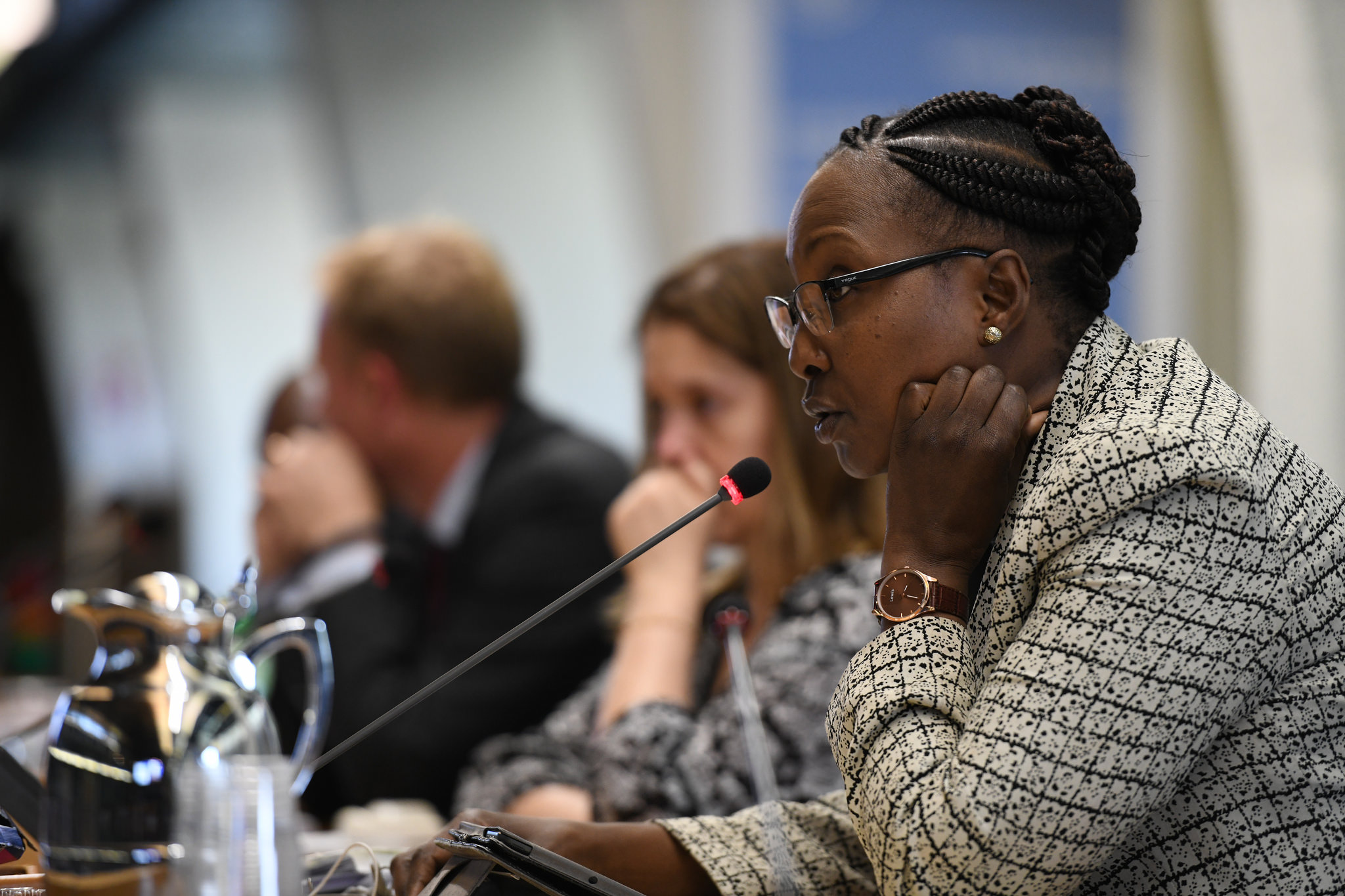Experiences and lessons in facilitating safe trade
A side session on global funding for food safety initiatives
“While the Codex Trust Fund is about establishing national Codex structures and helping developing standards, the Standard Trade Development Facility (STDF) comes in at the following step to help countries implement the standards,” explained Melvin Spreij, Head of STDF Secretariat at a side event of the Codex Alimentarius Commission. “Achieving food safety is a joint responsibility. We encourage developing countries to apply to STDF project preparation grants and project grants”, he added.
The STDF, a global partnership, helps developing countries increase their capacities to meet international standards and gain and maintain market access.

Lucy Namu, KEPHIS
Lucy Namu of KEPHIS presented a global Maximum Residue Level (MRL) project aimed at facilitating market access of tropical fruits. “The project in Africa was focused on mango. The problem was to find a management tool for pests, then to deal with pesticide residues”, she explained. “As a result, African countries have initiated a harmonization process for MRLs of pesticides in mango and will submit a MRL proposal through the Codex standard setting process later this year”, she concluded.
“SPS issues are multi-disciplinary,” Benoit Gnonlonfin, STDF Developing Country Expert explained. “Countries face challenges with border management, lack of coordination and feedback mechanisms at national level, mistrust of SPS decision-making process, and poor SPS notifications from member states.” Recalling the value added of STDF as a coordination/knowledge platform, he underscored the importance of sound project development.
Among other countries, Senegal thanked donors for the funding received for the STDF project on improving market access for small-scale fisheries in West Africa, recognizing that it supported capacity building and information exchange activities with a number of stakeholders.
The CAC Chair also shared his experience with STDF as an expert from a developing country. “STDF supports Codex in facilitating trade and protect consumers’ health”, he concluded.
Over the last twenty years, the agricultural sector has seen remarkable growth, especially in developing countries. With increased movement and trade of agricultural products come increasing sanitary and phytosanitary challenges. Thus, strong national sanitary and phytosanitary systems become critical for countries to facilitate trade and protect consumer health.
For more information, visit the STDF website and read the document submitted for CAC41.
Photo credit: ©FAO/Joan Manuel Baliellas / FAO
At the heart of the Codex mandate are the core values of collaboration, inclusiveness, consensus building and transparency. Governmental and non-governmental, public and private organizations alike play a vital role in ensuring Codex texts are of the highest quality and based on sound science.
Codex would have little authority in the field of international standard setting if it did not welcome and acknowledge the valuable contributions made by observers. Expert technical bodies, industry and consumer associations
contribute to the standard-setting process in a spirit of openness, collaboration and transparency.
Intergovernmental organizations (IGOs) and international non-governmental organizations (NGOs) can apply for observer status in Codex in order to attend and put forward their views at every stage of the standard-setting process.
 Current Codex Alimentarius Commission
Current Codex Alimentarius Commission
Experiences and lessons in facilitating safe trade
A side session on global funding for food safety initiatives
“While the Codex Trust Fund is about establishing national Codex structures and helping developing standards, the Standard Trade Development Facility (STDF) comes in at the following step to help countries implement the standards,” explained Melvin Spreij, Head of STDF Secretariat at a side event of the Codex Alimentarius Commission. “Achieving food safety is a joint responsibility. We encourage developing countries to apply to STDF project preparation grants and project grants”, he added.
The STDF, a global partnership, helps developing countries increase their capacities to meet international standards and gain and maintain market access.

Lucy Namu, KEPHIS
Lucy Namu of KEPHIS presented a global Maximum Residue Level (MRL) project aimed at facilitating market access of tropical fruits. “The project in Africa was focused on mango. The problem was to find a management tool for pests, then to deal with pesticide residues”, she explained. “As a result, African countries have initiated a harmonization process for MRLs of pesticides in mango and will submit a MRL proposal through the Codex standard setting process later this year”, she concluded.
“SPS issues are multi-disciplinary,” Benoit Gnonlonfin, STDF Developing Country Expert explained. “Countries face challenges with border management, lack of coordination and feedback mechanisms at national level, mistrust of SPS decision-making process, and poor SPS notifications from member states.” Recalling the value added of STDF as a coordination/knowledge platform, he underscored the importance of sound project development.
Among other countries, Senegal thanked donors for the funding received for the STDF project on improving market access for small-scale fisheries in West Africa, recognizing that it supported capacity building and information exchange activities with a number of stakeholders.
The CAC Chair also shared his experience with STDF as an expert from a developing country. “STDF supports Codex in facilitating trade and protect consumers’ health”, he concluded.
Over the last twenty years, the agricultural sector has seen remarkable growth, especially in developing countries. With increased movement and trade of agricultural products come increasing sanitary and phytosanitary challenges. Thus, strong national sanitary and phytosanitary systems become critical for countries to facilitate trade and protect consumer health.
For more information, visit the STDF website and read the document submitted for CAC41.
Photo credit: ©FAO/Joan Manuel Baliellas / FAO
 Codex and Observer
Codex and Observer
around the world since ancient times.
We might not always know where it comes from,
but we expect it to be available, safe and of good quality.









Leave a comment